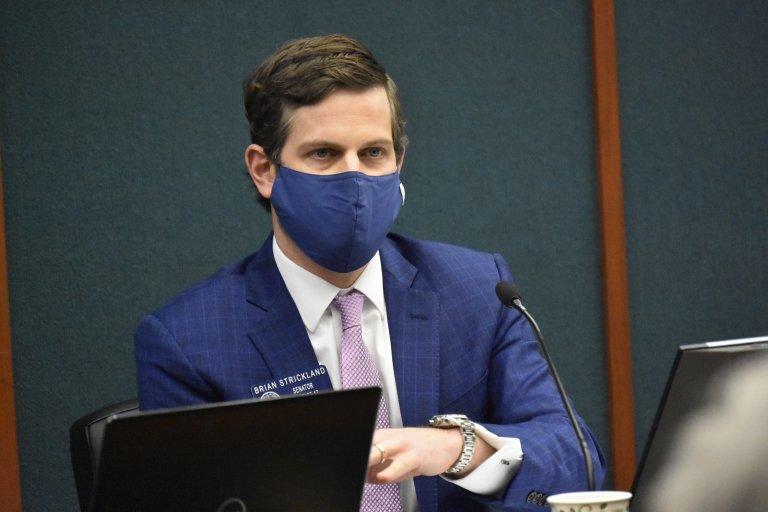
Caption
Sen. Brian Strickland introduced his bill allowing judges to temporarily suspend the right to a speedy trial in Georgia Monday.
Credit: Ross Williams/Georgia Recorder

Sen. Brian Strickland introduced his bill allowing judges to temporarily suspend the right to a speedy trial in Georgia Monday.
COVID-19 has created a massive backlog in Georgia’s criminal courts, and lawmakers are proposing to allow judges to temporarily suspend a defendant’s right to a speedy trial under state law.
The proposal aims to avoid a rush of requests for a speedy trial once court proceedings get back to a pre-pandemic pace. That could create tough choices for some judges who might have to give up prosecution of some cases if they are overwhelmed with demands from defendants and their attorneys.
On March 14, 2020, Georgia Chief Justice Harold D. Melton signed a statewide judicial emergency order suspending jury trials. He has extended that order every 30 days since then, but in his latest extension Melton held out hope that a decline in the number of cases along with the state’s vaccine rollout will allow jury trials to resume next month.
“If things continue to show themselves as favorable, barring any setbacks, our hope is to open up jury trials in our March order,” Melton said in a remote emergency meeting last Monday with members of the Georgia Judicial Council.
Once the order is lifted, it could take more than a month for trials to begin due to the time it takes to summon jurors, but with so many people waiting for their day in court, meeting state requirements for a speedy trial could be difficult, said Sen. Brian Strickland, a McDonough Republican and attorney.
“If you don’t do something this session on this issue, then you’re going to see potential for folks to take advantage of our current statutory protections that we have with speedy trial demands, and then you’re going to have situations where prosecutors and judges are trying to figure out which cases they’re going to let go,” Strickland said.
Strickland introduced legislation to allow judges to temporarily suspend the right to a speedy trial under state law after a judicial emergency. A court could suspend the right for twice the length of the preceding judicial emergency, and the Chief Justice of the Georgia Supreme Court would be authorized to reinstate speedy trial requirements.
Strickland presented the bill Monday as chair of the Senate Judiciary Committee.
Chief Judge Christopher Brasher of the Atlanta Judicial Circuit urged the committee to approve it.
“When we started last year, we had roughly 2,800 people in the Fulton County Jail. Ten percent of them were unindicted. Now, 50% of those defendants are unindicted,” Brasher said. “All those cases are going to be indicted in short order. Without this kind of protection, it would be foolish for many of those folks not to file the demand for speedy trial, they would have the ability to have their case resolved in a short order, one way or the other. And so we would then be forced to try cases that are three months old as opposed to three years old.”
The backlogs persist despite efforts from judges to release as many nonviolent defendants on bond as possible, said Henry County Superior Court Chief Judge Brian Amero, who also supports the measure.
“What we’re trying to do is make sure that the only people who are in the jail are the people who are a clear threat to the community based upon what we’re seeing,” he said. “We want everyone out that we can get out of the local jails. There’s also a COVID threat by having too many people in the local jails. The sheriffs have made it perfectly clear to us: Please don’t keep anybody in there unnecessarily. And we hear that; we support them.”
Denying the right to a speedy trial puts defendants who have been waiting in jails at a disadvantage, said Georgia Association of Criminal Defense Lawyers Executive Director Jill Travis.
“Public health orders are designed to slow a pandemic not to give the government an advantage in criminal trials,” she said.
Travis listed multiple changes she would like to see to the bill, including a sunset clause so it would not apply to any future judicial crises and a list of factors to consider before suspending speedy trials, including the number of demands before and after the emergency order, a lack of suitable space for hearing trials and current health restrictions.
Something needs to be done to deal with the situation, but Travis said she hopes whatever legislation passes will be limited in scope.
“Your organization agrees that something needs to be done, that we can’t just leave the current statute in place, correct,” Strickland asked.
“I’m a realist,” Travis said. “And so is my organization.”
The bill has no effect on defendants’ right to petition for a speedy trial under the U.S. Constitution, which is a different process than under state law. The right to a speedy trial is a guarantee that the government can’t incarcerate someone indefinitely without showing proof the defendant committed a crime.
A constitutional request for a speedy trial considers multiple factors including potential prejudice to the defendant and has no time frame. A statutory request, on the other hand, must be filed in the same court term of the indictment or in the next one.
The length of terms of court in Georgia vary and range from two to six months. The state then has the next two terms of court to try the case — three if it is a capital offense — or the defendant is acquitted.
The committee is expected to take the bill up again on Wednesday.
This story comes to GPB through a reporting partnership with Georgia Recorder.